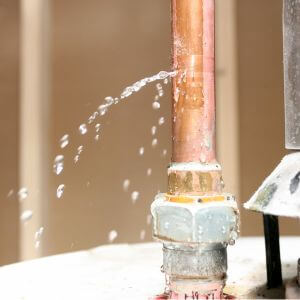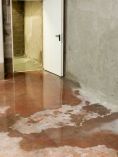Watch Your Water Lines

Where’s that water coming from? What’s that smell? What happened to our water pressure?
When you think of home maintenance, you probably don’t give a lot of thought to your water lines, but if a water line goes bad it can cause a significant amount of damage to your home. Bad water lines can lead to leaks that cause damage to walls and floors, and even mold or foundation problems if the issue is undetected and unaddressed.
There are two main categories of water lines to be concerned about – supply lines and drain lines. Supply lines feed water to your home, and drain lines are meant to send water out. Although both can cause damage if they need to be repaired, drain lines are the cause of most water damage issues that go undetected. Since there isn’t always a high volume of water pouring out of damaged drain lines, you might not notice the damage until there’s a problem. That’s why it’s a good idea to have your pipes cleaned by a plumber every 18-24 months. In between professional cleanings, clean your drains monthly with an enzyme-based cleaner. Supply line damage is usually easier to see since a broken supply line can cause a significant amount of water to flow and cause damage.
Signs of a Problem
How can you tell if you have a water line problem? Watch for:
- Greatly reduced water pressure in your faucets
- Gurgling, banging or whistling sounds from your pipes
- Higher water bills without an obvious increase in usage
- Puddles on the floor or even in your yard
- Mold and mildew growth
- Water stains on walls or ceilings
- Bad smells coming from your drains
Prevent Plumbing Problems in the Kitchen
You use a lot of water in the kitchen. Think about your sink drain, garbage disposal, dishwasher and ice maker. To prevent supply and drain line problems in these areas:
- Avoid pouring grease and food scraps down the drain. It’s also a good idea to use a drain screen for kitchen sinks.
- Avoid putting starchy foods, fibrous foods, coffee grounds and eggshells in your garbage disposal.
- Clean your ice maker tray regularly and check the water supply line for leaks. Replace it if necessary.
- Clean dishwasher spray arms, jets and filters regularly and check for leaks around the seal.
Preventing Plumbing Problems in the Bathroom
The bathroom is the other area of your home where you use a lot of water. Obstructions to toilets, sinks or other types of drains can cause water to either back up or overflow and often cause substantial damage. Protect your plumbing here in the following ways:
- Use a drain screen for tub and shower drains to avoid hair clogs in your pipes as well.
- Don’t flush anything down the toilet other than human waste and toilet paper—even if the packaging says the item is flushable.
- Don’t use low-flush toilets to save water—they have a hard time getting waste through the sewer lines.
Preventing Plumbing Problems Throughout Your House
There are other areas in your house that may have water lines. To keep all your water lines in good condition between professional cleanings, regularly flush and clean them by filling all the sinks, washing machines and bathtubs in your home first with hot water, then with cold water. Drain them all at the same time to flush debris out of the system.
Outside, tree roots can cause problems if they are too close to sewer lines. If your house is new, be mindful of this when planting new trees to avoid future plumbing problems. If your house already has mature trees in the yard, consider removing the roots.
It’s easy to forget about your outdoor faucets in winter, but those need attention too. This could be due to a washer or packing nut deteriorating, which would cause it to lose its watertight seal. A more common problem with outdoor spigots is freezing in the winter. Disconnect all hoses from spigots in the fall and cover them with an outdoor faucet cover. These can usually be found for less than $5 each at hardware or home improvement stores.
Some of the damage caused by water line failure is significant enough to make a claim on your homeowners insurance. It’s worth noting that your homeowners policy likely will not cover fixing the water lines, but it may be helpful when it comes to repairing damage done from a water line problem. Of course, every situation is different, and all coverage options are subject to the provisions of the policy purchased and details of your situation.
-
Prevent Leaks from Frozen Pipes
 Keep Them Warm
Keep Them WarmWhen pipes freeze, they can burst and lead to costly leaks. Don’t let it happen to yours!
-
Keep These Pipes from Freezing Too
 Here's How
Here's HowSpeaking of freezing pipes, don’t forget to prepare your pool and/or hot tub for winter before the first freeze sets in.
-
Other Sneaky Leaks
 Prevent Them
Prevent ThemLeaks you can’t see aren’t always caused by water lines. There are other ways water can get in and lead to big problems too.
